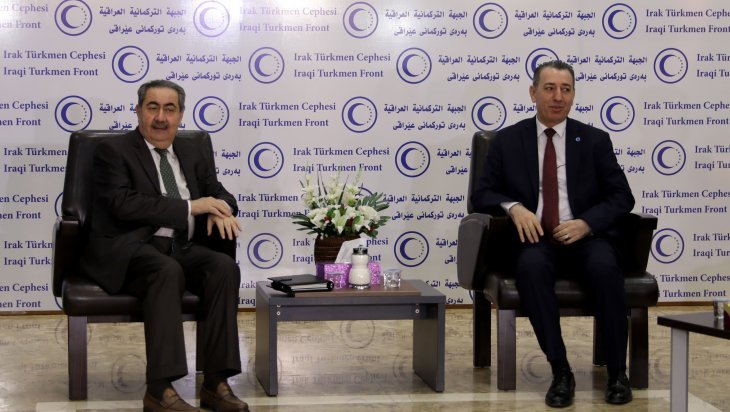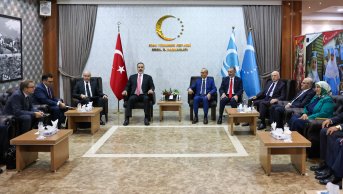Provincial Council Elections and Turkmen-Kurdish Relations in Iraq

Iraqi Turkmen constitute the third largest community in Iraq after Arabs and Kurds, and they are one of the founding elements of Iraq. Turkmen live in Kirkuk, Nineveh, Salahaddin, Diyala, Erbil, and Baghdad. In addition, it is possible to encounter a Turkmen population in almost every province from the north to the south of Iraq. The regions where Turkmens live densely are considered as a transition zone between the regions under the control and administration of the central government and the Kurdistan Regional Government of Iraq (KRG). This transitional area allows Turkmen to communicate directly with Kurds. In addition, most Turkmen-populated cities are considered ethnically mixed, with Kurds, Arabs, and Turkmen present in most of them.
Nature of Turkmen-Kurdish Relations
Throughout Iraq's recent history, relations between Turkmen and Kurds have been characterized by tensions due to differing goals. Relations between Turkmen and Kurds are generally based on political rivalry in areas where different communities live. This rivalry has evolved into an armed conflict, especially in Tuz Khurmatu and Kirkuk. Since 1995, when the Iraqi Turkmen Front (ITF) was established in Erbil, the Kurds have been suspicious of the Turkmen political movement and started attacking the ITF offices in Erbil a few years after its establishment. In 2008, Kurdish demonstrators burned down the ITF headquarters in Kirkuk. On 25 September 2017, during the referendum process for the KRG independence, the central government reasserted its control over Kirkuk in a military operation on 16 October 2017, wrestling control from the KRG. In October 2017, armed clashes broke out between Peshmerga and Turkmen groups affiliated with Hashd al-Shaabi forces.
A calm atmosphere prevailed in Turkmen-Kurdish relations after 2017. The two sides achieved consensus on political discourse for some issues. In particular, it was noteworthy that they developed similar discourse regarding the allegations of "Arabization" campaigns in Kirkuk. Consensus has also emerged on some issues, such as the demand for the return of agricultural lands in Kirkuk, which were given to Arabs during the previous regime, to their rightful owners.
As the provincial council elections in December 2023 approach, the political rivalry between Kurds and Turkmen has resurfaced. On August 11, Turkmen MP Mehdi Taqi Ismail opened an office in a Kurdish neighborhood at Tuz Khurmatu, provoking reactions from Kurdish forces in the city. The incident escalated into an armed clash between MP Mehdi Taqi's supporters and Patriotic Union of Kurdistan (PUK) MP Mullah Karim Shekur, in which one of Mehdi Taqi's supporters was injured. The crisis was later brought under control and those responsible were handed over to the local administration.
On the other hand, the pace of communication between Turkmen and Kurdish political parties has accelerated recently. Kurdistan Democratic Party (KDP) official and Deputy Speaker of the Iraqi Parliament Shahavan Abdullah visited the headquarters of Turkmen parties in Kirkuk and met with Turkmeneli Party Chairman Riyaz Sarikahya and then with ITF Chairman Hasan Turan. Prior to this visit, PUK Chairman Bafel Talabani met with ITF Chairman Hasan Turan at the ITF headquarters in Baghdad. It was also noteworthy that Ershad Salihi, one of the most critical and hardliner politicians against the Kurds' Kirkuk policy, made a statement in Kurdish. On the other hand, there are rumors among Turkmen circles about the possibility of a meeting between Hasan Turan and KDP Chairman Massoud Barzani in the near future. Such a meeting between Hasan Turan and Massoud Barzani could be the beginning of a new era in Turkmen-Kurdish relations in Iraq.
Will we witness a change in Turkmen-Kurdish relations in the near future?
Turkmen relations with the Kurds vary according to the political differences between the Kurdish and Turkmen communities. Turkmen are politically divided into two groups. The first is the nationalist Turkmens who have strong relations with Türkiye. The second are Turkmen who are allied with Shiite parties close to Iran, which control the political scene in Baghdad. There are also Turkmen allied with the Kurdish parties that control the political scene in the KRG region. Turkmen shape their alliances according to the KDP and PUK, the executive power of Kurdish politics. While nationalist Turkmens tend to develop relations with the KDP, Turkmens who are aligned with Shiite parties close to Iran gravitate towards the PUK.
There are several factors that encourage the development of Turkmen-Kurdish relations in Kirkuk. One of them is the good relations between the KDP and Türkiye. Türkiye can contribute to the development of these relations. In particular, Turkey can play an important role in improving the relationship between the ITF, the most important and largest Turkmen party in Iraqi politics, and Erbil. As a matter of fact, the division among the Kurds in the KRG and the fact that no Turkmen, Kurdish, or Arab political party was able to secure a majority in the provincial council elections in Kirkuk pushed the KDP to improve its relations with Turkmen parties.
Moreover, the possibility of a political alliance between the PUK and the KDP before the next provincial council elections will push these parties to seek alliances outside the Kurdish political arena. Here, the ITF appears to be one of the most suitable options for the KDP to reach an agreement. This is because there is a large Turkmen population in Erbil. There is a strong relationship between the Turkmen of Erbil and the KDP. The ITF has a ministry in the KRG cabinet. According to allegations, the KDP granted the post of ministry to Turkmens as a political courtesy towards Türkiye.
On the other hand, there is a strong relationship between the PUK and the Shiite Coordination Framework parties. Therefore, an alliance and a political agreement between Turkmen close to Shiite parties and the PUK is possible before or after the upcoming provincial council elections. Turkmen currently have 7 members in the Iraqi parliament. Three of these are affiliated with the Shiite Coordination Framework parties, and two are of the Badr Organization. Therefore, the Badr Organization (Northern Branch), which is located in Turkmen-populated areas, may form an alliance with the PUK, which has strong relations with the Shiite Coordination Framework.
In contrast to the factors enabling the development of Turkmen-Kurdish relations, there are also a number of obstacles to the development of relations, as the ITF has internal disagreements that could hinder its approach towards the Kurds. Previously, there have been some disagreements between ITF president Hasan Turan, and Ershad Salihi, the former president and the Turkmen representative in the Iraqi parliament. Ershad Salihi has a strong influence on the Turkmen community in Kirkuk. Since Hasan Turan represents the conservative wing of the ITF, his attempts at rapprochement with the KDP could be interpreted by some Turkmens as an alliance against the national interests of Turkmens in Kirkuk. This wing has Islamic tendencies as well as adherence to Turkmen national values. For this reason, Hasan Turan’s attempts towards the KDP may be seen by his opponents as a sectarian rapprochement rather than an agreement of political interests.
Article 140 of the Iraqi Constitution brings a mechanism for resolving the territory dispute between Kurds, Arabs, and Turkmens and determines the method to define the status of these territories. One could argue that this article is the biggest obstacle to the development of Turkmen-Kurdish relations. This is because Article 140 of the Iraqi Constitution envisages procedures consisting of three successive steps: first, normalization in these regions, second, a census and finally a referendum to determine the fate of the administrations. However, the difference of opinion between the Turkmen and Kurdish political parties on how to implement this article reduces the chances of rapprochement between the two parties.
Kirkuk Governor Rakan Said al-Jubouri has good relations with Türkiye, as well as strong relations with Turkmen leaders. In this context, the good relations of some Turkmen, Kurdish, and Arab parties with Türkiye could be a factor in the formation of a post-ethnic coalition in Kirkuk against a (possibly already formed) pro-Iranian alliance of Turkmen, Kurdish, and Arab parties.
Conclusion
Turkmen-Kurdish relations are quite complex. Due to the expansionist policies pursued by the Kurds aimed at annexing disputed territories to the KRG, Turkmen have always adopted an antagonistic policy towards the Kurdish parties in their region. The Kurds still demand the implementation of Article 140 of the Iraqi Constitution according to their own views, and not according to the views of other parties interested in this issue. This is the most important obstacle to Turkmen-Kurdish rapprochement in general and rapprochement between the ITF and the KDP in particular. There is still a lack of trust between them as both sides have different goals and national values. The Kurds are trying to return to the disputed territories call them "Kurdistani regions" and annex them to the KRG through Article 140 of the Constitution. On the other hand, Turkmen are trying to preserve the status quo. This is because Turkmen, who are both nationalist and close to Iran, have military organizations under the umbrella of Hashd al-Shaabi Forces. This situation pushes Turkmens to argue that the disputed territories belong to the central government.
One could argue that mutual visits between Turkmen and Kurdish leaders in the coming period may present opportunities for the two sides to reach a consensus, cooperate, and solve the problems related to the disputed areas. Moreover, any Turkmen-Kurdish rapprochement will facilitate the process of electing the governor of Kirkuk with an alliance after the upcoming provincial council elections. In conclusion, both communities have struggled throughout Iraqi history to achieve their political and cultural rights. From this point of view, it is important to meet on common ground in mixed-ethnic regions, especially Kirkuk.
This article was published on the Arabic Post news website with the title مع قرب الانتخابات المحلية في العراق.. هل نشهد تحولاً في العلاقات التركمانية الكردية؟










